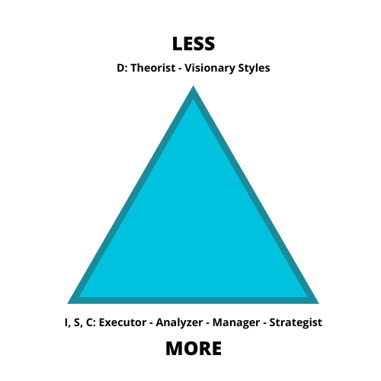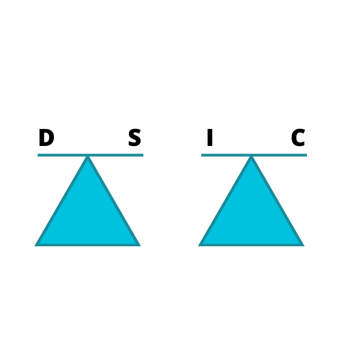You’re a motivated solopreneur with an innovative solution to one of the most pressing problems in your industry. You have been working hard, but you are struggling to keep up because there is so much demand for what you do and limited resources available on top of that! To make things worse, you’re starting to worry about another potential founder beating you to market.
The realization: you can't do it all by yourself anymore. You need help, and without anyone to take some of this pressure off your shoulders - you'll never continue moving forward.
Though you’ve found others willing to join your founding team for no more than equity and a chance to build something meaningful, you know you don’t want just anyone. One wrong team member can sink you before launch. Fortunately, with tools like DISC, TEAMS, and BAI, founders are curating behaviorally healthy teams from the get go when time, money, and resources are in short supply.
There’s an Art to It
In a study about startup performance, venture capitalists attribute 65% of startup failures to the company management team. Your ideal founder team is a balanced and synergistic mix of soft and hard skills. Where one is weak, the other is strong. This keeps everyone in their lane and spreads out the skill sets and expertise where they are needed.
You Need People
Sure, you could argue the greatest strength of your startup is timing, product market fit, disruptiveness, or “secret sauces”. No doubt these planet alignments are critical, but pale in comparison to the driving force - your team. Startups live and die by its people.
According to the Startup Genome Report, solo founders typically take 3.6 times longer to scale when compared to startup teams of two or more. Additionally, investors see solo founders as non-team players or unable to get others to believe in their idea. It reads as a vote of no confidence.
…and Not Just Any People
Make no mistake, the early stages of a startup are critical to success. Just as you wouldn’t (or at least probably shouldn’t) rush into a marriage, avoid making any hasty hiring decisions. Take some time and pick wisely for the long-term benefit that they will bring you in this new venture together.
Adopt the Startup Ecosystem Reality Check
For anyone not familiar with startup life, they need full disclosure at the start. Startup realities require certain attributes:
- Flexibility and adaptability: change is the constant
- Energy and passion: not for the faint of heart, requires more faith, hope, and sweat than your last role
- Relentless creativity: ability to make it up as you go, scrap it, then make it up again
- Doing more with less: assume you will not have the same resources you had in your last position
- Rapid learning: learning on the fly is critical; onboarding is a luxury not offered here
- Teamwork fit: it takes everyone all the time. Mutual understanding and respect of strengths is key
Assess Yourself First
NY Times Bestselling Author, Neil Patel believes startups begin with the founder’s self-awareness. Start by asking the question “what am I good at, what do I lack?” And he’s not talking just about hard skills. Assess your personality, team thinking style, and work values alongside your hard skills. Identify your strengths. Find other people with complementary skills and behaviors for the rest. It’s that simple.
 Personalities Matter
Personalities Matter
This piece can’t be overlooked according to Neil Patel. Friction is the best way to sink your ship. Much of this can be avoided with a blend of personalities that won’t rock the boat. There are certain strong personality styles or specific traits you may want to keep to a minimum.
This DISC approach is reminiscent of the food pyramid. Less strong, Theorist - Visionary - Driver personalities (D styles) and more enthusiastic, empathetic, detailed styles (I,S,C) for action-oriented, Executor, Analyzer, Manager and Strategist roles. That doesn’t mean the bottom is ANY LESS IMPORTANT than the top, it simply means less and more, like the food pyramid.
Use Balance and Diversity
“If you’re in a startup team where everyone else is just the same as you, then Congratulations! You’ve managed to multiply your weaknesses by the number of cofounders you have” - Foundr Magazine
Balance: Curate to balance personality styles with complimentary opposites. This requires mutual understanding of each other’s strengths. For best productivity D styles need S styles. Likewise, S styles need D styles. I styles need C styles and C styles need I styles. Your team should be a subtle and dynamic balance of opposites.
Diversity: Curate for diversity in team roles.
Startup teams need certain roles filled with founders, advisors, and subcontractors. Typically, someone is the brainchild or the person/people who gave birth to the idea and began to move it forward. Once the idea is out of the womb so to speak, it begins to take on a life of its own as others join the effort.
Typical team roles are below with one caveat. One person, albeit a special person, can fill several roles. Use the PeopleKeys TEAMS profile along with the PeopleKeys DISC profile to help you narrow down the personality and team’s thinking style of each person on your startup team. Five important team roles for your startup team: Theorist, Executor, Analyst, Manager, and Strategist.
Your team is your most valuable asset. You can have all the passion and creativity in the world, but if you don't have people with skills to put things into action, it's just a waste of time! Soft skills tests should be a fundamental step in bringing new people onboard.
Sharing personal preferences, Personality Styles, and Team Styles transparently at the start of each hire helps to build trust. Your team gets an opportunity to understand and appreciate one another’s strengths and limits so you can begin to build your brand.




.jpg)
